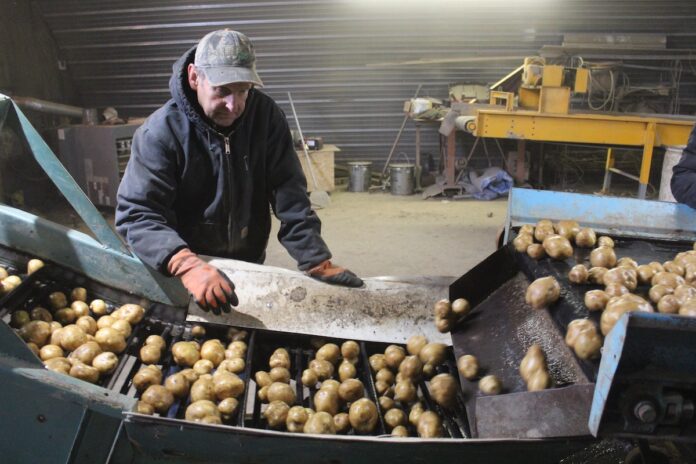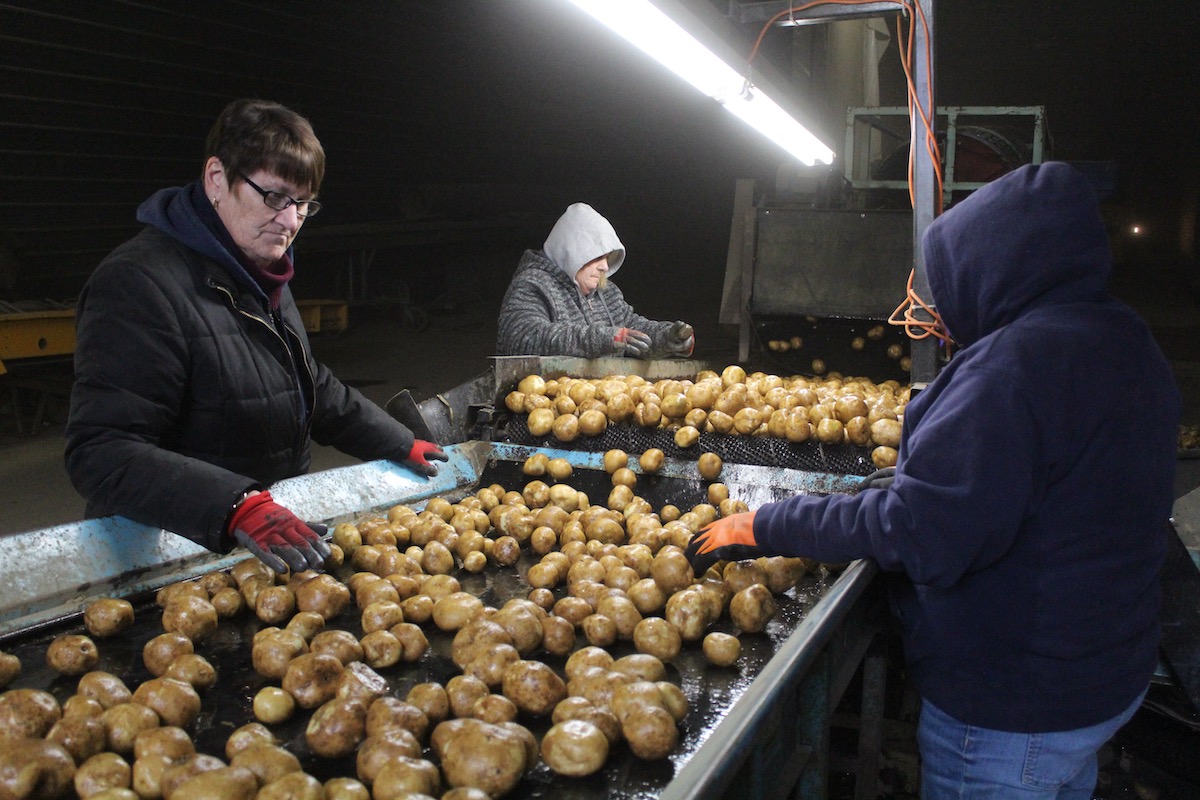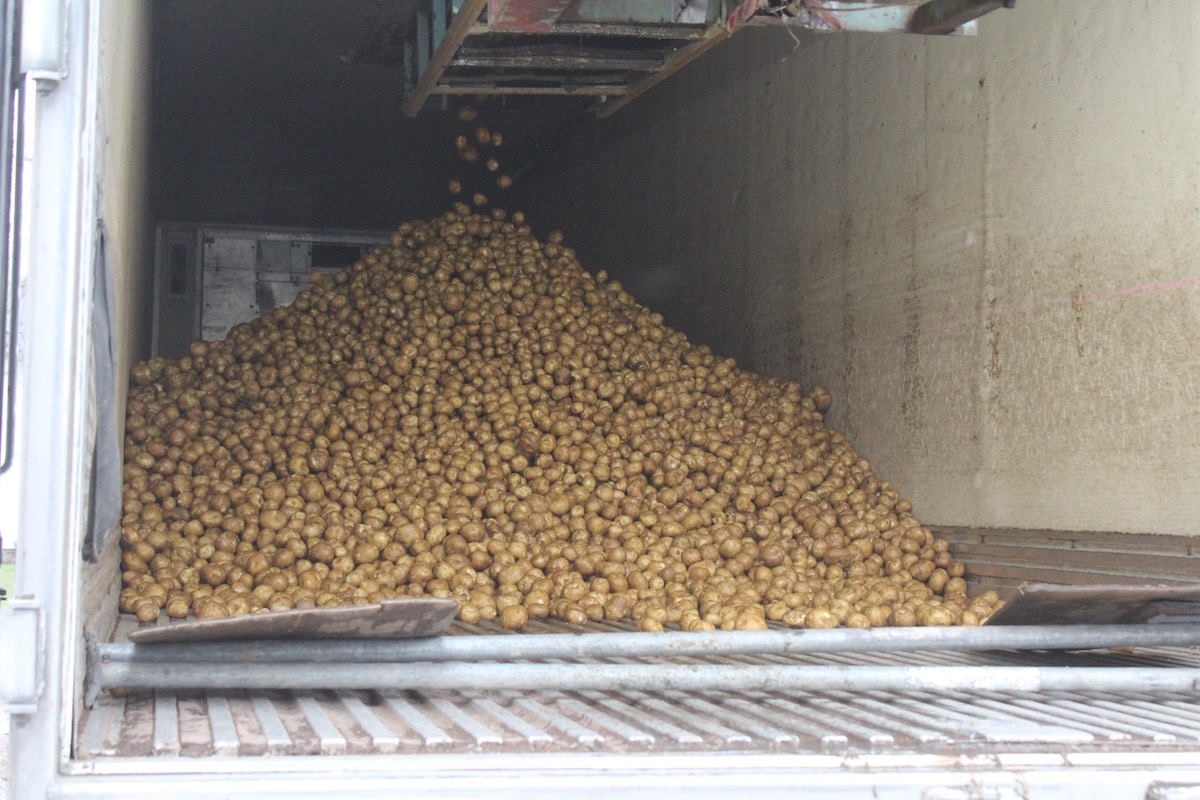
CAMBRIDGE SPRINGS, Pa. — Potatoes roll down the grading line at one of Troyer Land Resources’s storage barns in northwest Pennsylvania on a November afternoon. These freshly cleaned potatoes are destined to become potato chips at Herr’s, one of the snack food manufacturers that put Pennsylvania on the map as the Snack Food Capital of the U.S.
Kevin Troyer stands at the end of the line, getting the final look at the potatoes before they are loaded into a semi-trailer. It’s a scene he’s intimately familiar with.
“I have a photo in my phone of me when I was 4 standing on the inspection line with my dad,” he said.
The Troyer family is part of the Pennsylvania Cooperative Potato Growers, which is celebrating its centennial this year. Agriculture Secretary Russell Redding joined cooperative members, processors and others to recognize the accomplishment Nov. 1, at the Bender Potato Farm in Orrstown, Franklin County.
“Pennsylvania and potatoes go hand in hand,” Redding said, at the event. “What would a Pennsylvania fair be without french fries, or the ‘Snack Capital of the U.S.’ without potato chips, or a Thanksgiving feast without a heap of buttery, whipped mashed potatoes?”
History
The cooperative was chartered June 13, 1922 with 22 members, growing from an association of potato growers. Nathan Tallman, president of the cooperative, said forming a cooperative gave them protection by the Capper-Volstead Act and allowed the group the ability to talk about pricing and work together on marketing.
During the heyday of the industry, the cooperative built the Potato City Hotel, in Coudersport, Pennsylvania, in 1949 as a hotel and restaurant that served as a banquet center and gathering place for the potato industry and a vacation spot for farm families, according to Tallman. The hotel closed in 2019.
There was also an experimental farm there, run by Ernest Nixon, the uncle of President Richard Nixon. Because of that family connection, Nixon, then a California senator, spoke at the Annual Pennsylvania Cooperative Potato Growers Banquet in 1952. That same year, the cooperative served its millionth baked potato to a customer at the Pennsylvania Farm Show.
The cooperative’s food booth at the Farm Show continues to be a draw for attendees, serving thousands of potato doughnuts, 12 tons of fresh cut fries and six tons of baked potatoes.
Pennsylvania has never been one of the top producers of potatoes in the country, but it is one of the top states for snack food manufacturing establishments, with 24 potato chip factories based in the state.
The cooperative handles marketing and logistics for its members, which includes selling potatoes to many of those snack food makers. There are 28 Pennsylvania growers in the cooperative that produce more than 83,000 tons of potatoes each year. There are also a number of associate members from other states that help fill contracts for potatoes year round, Tallman said.

Growing potatoes
The two main markets for potatoes in Pennsylvania are chipping potatoes and table stock, with slightly more acreage being devoted to chipping potatoes, Tallman said. Chipping potatoes become potato chips. Table stock is what’s sold to grocery stores and restaurants.
Varieties that make good chips do not work well at home, Tallman said.
“They’re meant to be fried, salted and seasoned,” he said.
The season begins in February or March when they buy certified seed potatoes, said Troyer, of Troyer Land Resources, in Waterford, Pennsylvania. He’s a third generation grower.
They start planting in mid-late April, with the goal of finishing by the end of May, Troyer said. Harvest begins in September. Chipping potatoes need to be harvested early before the ground freezes or the composition of the potatoes could change, Troyer said. Tallman said most growers in Pennsylvania want to be done harvesting by Halloween.
The gravelly, sandy soil around Erie County seems to be good for growing potatoes, but it’s more than just the soil. Troyer said the cooler, cloudier weather near Lake Erie also seems to produce a higher gravity content in the potato, which means it is more solid and has less water. This is the ideal for chipping potatoes.
“When you fry the potatoes, you fry out the water and replace it with oil,” Troyer said. “If you have more solids, it costs less in heat and oil to cook the chips. And it makes a healthier chip because you’re using less oil.”

Troyer’s father Cletus and uncle Clifford opened their own potato chip factory, in Waterford, Pennsylvania in 1967. The family grew potatoes and made potato chips for the Troyer Farms brand for several decades. Kevin’s side of the family left the potato chip factory in 1984 to focus full-time on farming. The plant is now owned and operated by Shearer’s.
Most of what Troyer grows now is chipping potatoes, but he does grow some varieties for table stock. Growing potatoes is a capital and land intensive operation. There’s a lot of specialized machinery involved at all parts of the process from planting to harvesting, as well as buildings needed to store potatoes until they’re ready to be shipped.
Troyer said he can store potatoes until the next growing season begins, but there’s usually a jump in demand for chipping potatoes through the holidays and football season.
His fields are on a four-year rotation with corn and soybeans. He’s found the longer he can rotate a field out of potatoes, the better his potatoes grow when he plants them again.
“Once you’re set up, it’s pretty lucrative,” he said. “You can make more money on less acres than you can on grain.”
(Reporter Rachel Wagoner can be reached at rachel@farmanddairy.com or 724-201-1544.)









